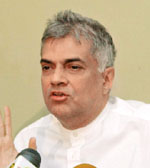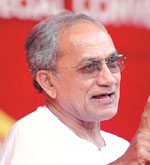Ensuring rights and reputations
 CONCEPT:
The recent kerfuffle over the debate on Sri Lanka in the British House
of Commons seems to me profoundly interesting not so much for what it
tells us about Britain, but for what it reveals about ourselves. Or,
rather, it confirms aspects of our political culture that should have
been obvious before, but always astonish when they recur again and
again. CONCEPT:
The recent kerfuffle over the debate on Sri Lanka in the British House
of Commons seems to me profoundly interesting not so much for what it
tells us about Britain, but for what it reveals about ourselves. Or,
rather, it confirms aspects of our political culture that should have
been obvious before, but always astonish when they recur again and
again.
I will begin with the concept that has been reiterated, most
prominently by the JVP if media reports are accurate, that the debate
represents an attack on our sovereignty. Underlying it is the assumption
that no country has the right to interfere in the internal affairs of
others.
|

Ranil Wickremesinghe
|
|

Somawansa Amarasinghe
|
|

David Gladstone
|
This assumption is patently nonsense in the light of reality, and in
particular modern reality. From time immemorial big powers have
interfered in the affairs of smaller countries.
Certainly in recent times there has developed a concept of morality
in this respect that has gained international currency, so that
interference for personal reasons is now generally condemned.
But interference for what can be presented as moral reasons has never
received much condemnation, and in recent years the parameters within
which interference has been not only accepted, but even positively
encouraged, have been fairly comprehensively established.
These were set out in the article I wrote a couple of months back
which discussed the role of India in our internal affairs, when I
pointed out that the conditions that made its involvement in 1987
internationally acceptable no longer obtain.
Those conditions, to put it roughly, are firstly humanitarian
deficiencies, where the failure of a government to ensure basics for all
or some of the population under its aegis allows for humanitarian
interventions even against the wishes of that government; secondly,
abuse of a particular section of the population within a country, which
is seen as evidence that the legitimacy of the established government is
in question with regard to at least some areas of the country; and
finally a proliferation of refugees, creating problems for other
countries, that will justify even interference on its own of any country
particularly affected, without formal international sanction.
It should be added that, as I pointed out in identifying these
guidelines for limitations on the doctrine of national sovereignty, I do
not think Sri Lanka has serious problems in any of these areas. But we
have to recognise that perceptions are more important than reality in
this respect.
We must therefore ensure that perceptions are not skewed, within
countries that might take the initiative in suggesting that intervention
of whatever sort is desirable. Given the facts that I believe are on our
side, any failure to present these facts coherently, either to those who
reach decisions or to those who create opinion, is our fault rather than
theirs.
I say this because it is crystal clear to us that there are forces
working overtime against the country and its government in this respect
and, if we cannot prevent them, we must at least be ready to counter
their propaganda.
Chief amongst these is the brilliant Tiger network of information and
disinformation, which we are very far from matching because we still
have not registered how serious its impact is. But sadly for the
Rajapaksa government, we also have now a very efficient campaign run by
Wickremesinghe, which has witting or unwitting support in the
influential segments of urban society that are his natural constituency.
President Rajapaksa has I believe realised the gravity of this
campaign, if reports on his discussion with Wickremesinghe before he
accepted the UNP defectors is accurate. A few months earlier I had
wondered whether he had been taken in by the latter when he signed the
MoU, which made no mention at all of the international dimension.
I thought this a particularly grave omission, given the advantage
taken by the Tiger controlled networks in highlighting for instance his
speech at MIT in America, in which he laid blame for the breakdown of
the talks foursquare on the government, despite his own experience of
having had the Tigers walk out on him. Fortunately for Rajapaksa, he
realised soon enough that he was being bad mouthed amongst governments
that matter; unfortunately, he has since done little to counter this.
This is sadder, in that there is reason to believe that governments
in general are not hostile to him. Certainly the solid measures taken
against the Tigers in recent months indicate that they are no longer
accepted unquestioningly as freedom fighters.
But this is where the escalation of the campaign against the
government on human rights issues is so serious, and why it is important
to refute the allegations that, if they flourish unchecked amongst those
susceptible to such propaganda, will in the end influence governments
too.
This is where it seems to me the reactions to the debate, which
somehow implied that the British government was at fault, confirm the
view that we really do not understand the way politics work in any
country except our own.
In part because of the continuing triviality of our teaching in
schools of civics, so that the distinction between legislature and
executive is totally unknown, in part because of the conglomeration of
power here is not just the central government but in a small group
within it, it is assumed that when any official body in any other
country does anything, the government of that country is somehow
responsible.
On the contrary, even a cursory reading of the debate in Britain
suggests that government spokesmen were quite objective, and did not
rush on a bandwagon that criticised the government. Indeed, most
speakers tried to be evenhanded, and it was only a few who seemed to
have swallowed wholesale the propaganda of the Tigers.
But unfortunately, as we know only too well in this country, it is
the vociferous minority that makes the running, that stirs up feelings,
and then dragoons decision makers to follow in its wake.
Given then that even those Members of the British Parliament who
understand the enormity of terrorism are susceptible to stories about
humanitarian lapses, the upshot is a general feeling that our government
could be doing more to solve the ethnic problem, and that the British
government should promote this.
To counter this, we should - apart indeed from doing more to solve
the ethnic problem, on the lines suggested by Anandasangaree and his
ilk, while at the same time continuing with the current tough
initiatives and responses that deal firmly with the terrorist problem -
respond to all those who took part in the debate, thanking them for
their interest and pointing out particular inaccuracies (for instance
the claim that the Tigers negotiated until the Wickremesinghe government
was changed, the suggestion that the films of attacks on Tamil civilians
represented an ongoing situation rather than relentless repetition of
the horrors of 1983).
But we should also ensure much more public awareness of and
accountability about rehabilitation programmes.
From what I gather from non-governmental sources, genuine efforts are
being made in this regard. But, given the paucity of capable personnel,
given the lethargy and in many cases dishonesty of our bureaucracy
(which rebounds on the government if firm action is not taken, which now
seems impossible in Sri Lanka given the networks of protection and
tolerance that have developed), given the failure to establish
networking with confidence between government and NGOs, it is not
surprising that claims of culpable neglect gain credence.
And of course we complicate matters by adopting a hostile attitude.
The demonstration outside the British High Commission by those whom the
Wickremesinghe style propaganda alleges to be the driving forces of the
Rajapaksa government can only contribute to further suspicions between
the two countries.
It is useless to claim that this is nothing to do with government,
particularly when there are enough propagandists to claim that the move
was initiated by the government (whereas no one in Britain or even here
for instance would claim that Tony Blair or Margaret Beckett had asked
Keith Vaz to criticise the Sri Lankan government in the House of
Commons).
Indeed this demonstration reminded me, entertainingly if it were not
also sad, on the demonstration that took place twenty years ago, after
the Indians dropped food parcels over Jaffna.
To quote from my forthcoming book, Declining Sri Lanka - ‘The next
week a monk close to the government organised a demonstration outside
the Indian High Commission...., At the government parliamentary group
meeting the previous day Jayawardene was reported to have exhorted his
followers to be present, and Harry Jayewardene joined the demonstration
along with several UNP politicians.’
This was just a couple of months before Jayewardene signed the
Indo-Lankan Accord. Of course, as I have said before, he was entirely
responsible for the situation that precipitated the Accord and the
suffering the country went through before and after; President Rajapaksa
is simply suffering the consequences of the ethnic strife Jayewardene
engendered.
But he should ensure that problems are dealt with practically, and
that demonstrations designed to score domestic points do not become a
substitute for thought and constructive action.
Meanwhile there is a delightful irony about the JVP demonstrating
outside the High Commission, with platitudes about the sanctity of
sovereignty. I don’t suppose many people remember now the pro-active
stand of David Gladstone when he was British High Commissioner here
during the crucial period from 1988 to 1991.
The horrors of those days are now largely forgotten, as came home to
me vividly when a friend referred to the unprecedented abductions of the
present period and the constraints on the media.
Such allegations are nonsense. The nineties and now are a sea change
from the Jayewardene period, when the state had a monopoly on the
electronic media, and there were only minor alternatives, generally
beholden to the government, to the state press.
And though much is made of abductions now, a careful perusal of
papers since these allegations began to spread suggests that the number
is small if you exclude those connected with extortions.
Of course extortion flourishes in a state of lawlessness, but in this
respect we are a far cry from the eighties when all leading politicians
had their own tame thugs, even Lalith Athulathmudali whose man - I
forget his name now - was shot outside the Lionel Wendt, and of course
Ranil Wickremesinghe with Gonawala Sunil and Kalu Lucky who led the
state sponsored demonstration against Supreme Court judges who had found
against the government in a Fundamental Rights case.
Those were the days when the JVP, while trying to give as good as it
got, suffered from abductions and the murder of its cadres. In those
days perhaps their most prominent refuge was the British High
Commissioner, who arranged safe conduct to England for many of them.
I have no idea whether Somawansa Amerasinghe was amongst these, but
certainly the JVP today must give credit to Gladstone’s commitment to
basic rights, specifically the right to life, which led him in fact to
subvert the strategies of the government to which he was accredited.
It was in part because of his involvement with so many young men
destined for death that Gladstone developed his bitter hatred of
Wickremesinghe, whom he characterised in those days as a young Fascist.
I think his prejudices sometimes went too far, as when he told me
after Ranjan Wijeratne’s death that Ran-il as he called him had hoped to
replace him as Deputy Minister of Defence, and was bitterly disappointed
when the ridiculous D B Wijetunge was appointed instead.
But, now, given the involvement of our opposition leader in criticism
of our government that influences the House of Commons, it astonishes me
that we have not at least tried officially to renew contact with
Gladstone, who could provide some sort of balance to the ahistorical
critiques of the government that are permitted to flourish
internationally. We need much more concerted efforts to counter the
current wave of anti-government.
Of course the best way is to ensure that the few abuses that do
occur, that are then recycled ad nauseam, are dealt with firmly so as to
prevent their recurrence. But we should also be able to maximise
positive achievements, and highlight them internationally.
Unless that happens, we have to expect that those concerned with
human rights will, whether mistakenly or not, focus attention on our
shortcomings. And we should not regret this, for like the JVP we have to
be aware that at some stage we too may be the victims of abuse. |

